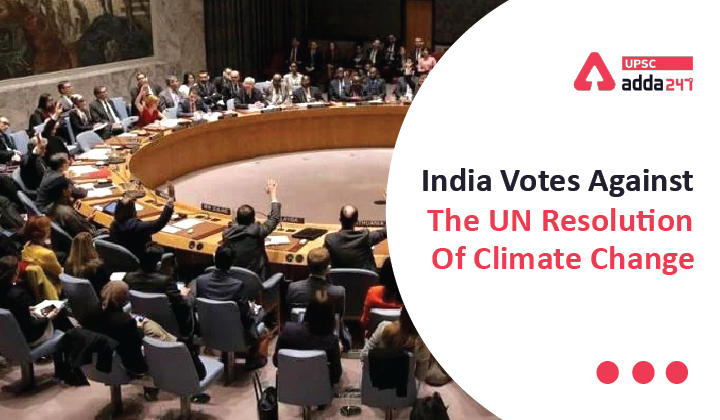Table of Contents
India Against Climate Resolution: Relevance
- GS 2: Effect of policies and politics of developed and developing countries on India’s interests, Indian diaspora.
India Against Climate Resolution: Context
- Recently, India has voted against a draft resolution seeking to create a formal space for climate change-related discussions at the UN Security Council.
India Against Climate Resolution: Key points
- India and Russia were the only two countries to oppose the draft resolution, China abstained from voting.
- Due to a veto from Russia, the draft resolution could not pass.
- The draft resolution was sponsored by Ireland and Nigeria.
- It sought to enable the Security Council to take up routine discussions on climate change from the perspective of its impact on peace and conflicts worldwide.
Draft Climate Resolution at UNSC: What the sponsors say?
- The sponsors argues that one of the lesser discussed aspects of climate change is its impact on international peace and security, which is a direct effect of climate-induced food and water shortages, loss of land or livelihoods, or migration.
- The sponsors, and supporters, also believed that this had implications for the UN field missions deployed to maintain peace and security, and therefore, it was a subject appropriate to be taken up at the Security Council.
Draft Climate Resolution at UNSC: Why India, China and Russia objected?
- The three countries believed that UNFCCC is an appropriate UN forum to discuss all matters on climate change.
- Security Council interventions on climate change will undermine the UNFCCC process, and provide disproportionate influence to a handful of developed countries on climate change decision-making.
Draft Climate Resolution at UNSC: What India said?
- UNFCCC process addresses both immediate needs of the developing and the commitments of the developed countries.
- UNFCCC seeks a balance between mitigation, adaptation, financing, technology, transfer, capacity building etc.
- India believed that that there is no real requirement for the resolution except for the purpose of bringing climate change under the ambit of Security Council, and the reason for that is decisions can be taken without involvement of most developing countries and without recognising consensus.
- India also said that ironically, many UNSC members are the main contributors of climate change due to historical emissions. If the Security Council indeed takes over the responsibility on this issue, a few states will then have a free hand in deciding on all climate related issues.
- India also advocated that climate change may have exacerbated conflicts in the Sahel region and across Africa, and viewing conflicts through the prism of climate change was misleading and an oversimplification that could worsen conflicts rather than resolving them.
Also Read:





 TSPSC Group 1 Question Paper 2024, Downl...
TSPSC Group 1 Question Paper 2024, Downl...
 TSPSC Group 1 Answer key 2024 Out, Downl...
TSPSC Group 1 Answer key 2024 Out, Downl...
 UPSC Prelims 2024 Question Paper, Downlo...
UPSC Prelims 2024 Question Paper, Downlo...







